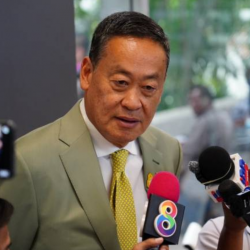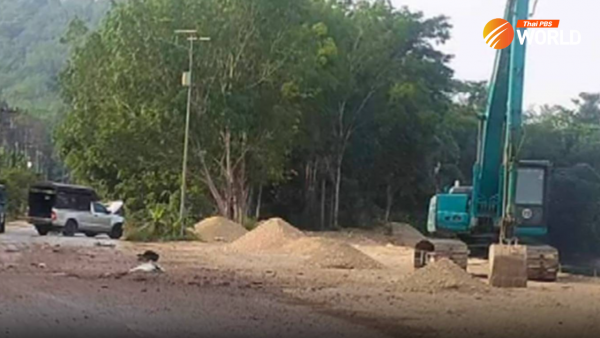No clear path to substitute China-made submarine with a frigate

A plan floated by the new civilian government to swap the procurement of a Chinese-made submarine with a frigate is hanging in the balance as the Defense Ministry has failed to get the Royal Thai Navy and Parliament on board.
Defense Minister Suthin Klangsaeng had said late in October that the navy had already decided to switch its order for a Yuan Class S26T submarine to a Chinese-made frigate. The move was supposedly aimed at tiding over the stalemate caused by the manufacturer, China Shipbuilding & Offshore International Co. Ltd. (CSOC), failing to secure the German MTU 396 engine for the submarine as stipulated in the agreement.
Prime Minister Srettha Thavisin discussed the matter with China’s President Xi Jinping and Premier Li Qiang when he was in Beijing from October 16-19 for the Belt and Road Forum for International Cooperation. The new deal, which would cost Thailand an additional 10 billion baht, would be worth the extra money, he had said.
Suthin, however, backtracked early this month, saying the deal was not final as the government and the navy needed to consult all stakeholders after harsh criticism over its high price and suitability. The more-expensive Chinese frigate would not be a perfect substitute for the submarine, as the two warships performed different functions, according to military experts.
A government initiative?
The experts believe that the idea likely came from the Srettha government rather than from the navy. The navy reportedly was prepared to accept China’s offer to use Chinese-made CHD620 engines after receiving a performance guarantee. The previous navy chief, Admiral Choengchai Chomchoengpaet, told the media before his retirement in September that the navy was about to inform the new government on its decision to take up the Chinese offer.
To avoid further criticism, Suthin instructed the current navy chief, Admiral Adung Phan-iam, not to attend a testimony on the submarine acquisition at the House of Representatives’ Military Affairs Committee on November 9, according to the committee chairman, Wiroj Lakkhanaadisorn.
Wiroj, an MP of the opposition Move Forward Party, said the government was required by Article 178 of the Constitution to reveal to Parliament for approval the terms and conditions of the so-called government-to-government agreement signed in 2017 if it wanted to make changes to the deal.
The committee is starting to doubt whether the terms and conditions have already been breached, as the submarine has encountered problems in procuring the specific engine for quite some time, he said. The navy should demand compensation for the damage from China, Wiroj added.
Clouded in confusion
Testifying on behalf of the ministry and the navy, General Adinant Chairoek, the Defense Ministry’s Director of Budget Division, told the House military committee on November 9 that the contents of the agreement could not be disclosed without the consent of the Chinese counterpart.
The agreement signed by representatives of the Thai navy and CSOC prohibited any of the parties from revealing parts of technology and innovation to protect intellectual property rights of the partner, he told the committee. He added that the navy had already approached the Chinese counterpart and was awaiting consent for disclosure of the agreement to the public.
The military officer said he was told by legal experts of the Council of State, the government’s legal advisory body, and the Foreign Ministry to use the terms “agreement” and “contract” with extreme caution as they have different legal meanings.
Thailand and China had signed an agreement, not a contract, on the submarine deal, he said and added that legal experts had told him the Constitution did not require Parliament to consider an agreement before the signing or amendment of its terms and conditions.
Wiroj said the situation might require the House of Representatives to seek a ruling from the Constitutional Court. He cited the joint communique signed in 2008 to support Cambodia’s proposal to list the Hindu temple of Preah Vihear as a World Heritage Site was interpreted by the Constitutional Court as a contract that required approval by Parliament. “By analogy, whatever it’s called, a document signed with a foreign country that is internationally binding needs approval from Parliament,” he said.
Paid but delayed
The Thai navy announced a plan to procure three attack submarines in 2015, when Thailand was run by a military regime under General Prayut Chan-o-cha. The 13.9-billion-baht contract to purchase the 2,550-ton, 77.7-meter long S26T submarines signed in May 2017 is set to expire by December 31 this year.
The Thai government has already paid more than 7 billion, or 63%, of the total cost of the project. The navy also has spent more than a billion baht to build infrastructure and facilities, such as docks, maintenance shipyard, torpedo warehouses as well as command and communication stations.
The Thai navy claimed that the 6.1-billion-baht landing perform dock (LPD 792) HTMS Chang commissioned in April this year was a part of the submarine project.
The amphibious vessel has never been used by any navy in the world for supporting submarine operations, according to an expert at the House’s military committee. The Chinese-made boat was bought separate from the submarine project, he said, and added the Thai navy should not use the LPD 792 to mislead the public for justification of the submarine deal.
The first submarine was supposed to be ready in September but the CSOC requested a 123-day extension due to the COVID-19 pandemic. The Thai navy has not made its decision on the request. If the delay was unacceptable, the navy has the right to get compensation at 0.05-0.06% of the cost, according to Adinant. The Thai navy planned to notify the manufacturer about the delay and seek compensation by the end of this year, he said.
There is a lack of clarity on whether the engine problem could be taken into consideration as a delay or a breach of contract.
The Thai navy was not aware of the fact that the diesel engine model 16V396SE84-GB31L is exactly a replica of MTU396, which Germany deems a military item and prohibits Chinese companies from manufacturing and selling since 1989, said Adinant. Chinese companies have manufactured this type of engine under German license for civilian use for 30 years, he told the House’s committee.
Another frigate?
While representing the Defense Ministry in the House committee testimony, Adinant said he had no knowledge about any deal to swap the submarine for a frigate. The Thai navy, in fact, had already planned to acquire a frigate and had been requesting a 17-billion-baht budget in fiscal year 2024, he said.
The Thai navy plans to have a total of eight frigates in its fleet to strengthen Thailand’s sea power. Of the five frigates being commissioned currently, four are old Chinese boats with western weaponry and communication system configurations.
The newest one, HTMS Bhumibol Adulyadej, constructed by South Korea’s Daewoo Shipbuilding & Marine Engineering Co Ltd, was commissioned in January 2019.
Under the cooperation with South Korea, a similar frigate in the same class would be built in Thailand with technology transfer arrangements. Their naval combat system links to other warships such as the HTMS Naresuan, HTMS Taskin, HTMS Chakkri Naruebet, and Gripen fighter jets of the Royal Thai Air Force.
It remains unclear why the Thai navy wants a different combat system and whether the new Chinese-made frigate Type 054A eyed by the navy would be compatible with the existing warships as it would be in a different class and more sophisticated.
The House’s committee expressed concerns about future problems, as it was unclear if France would sell the Pielstick engine to be installed in the Chinese-made frigate.
Adinant said he could not clarify whether the proposed Chinese frigate would replace the second South Korean-made boat or would be an addition to the Thai naval fleet. “Even if the Royal Thai Navy takes both ships, Thailand would still need one more frigate to complete the fleet,” he said.
By Thai PBS World’s Political Desk






